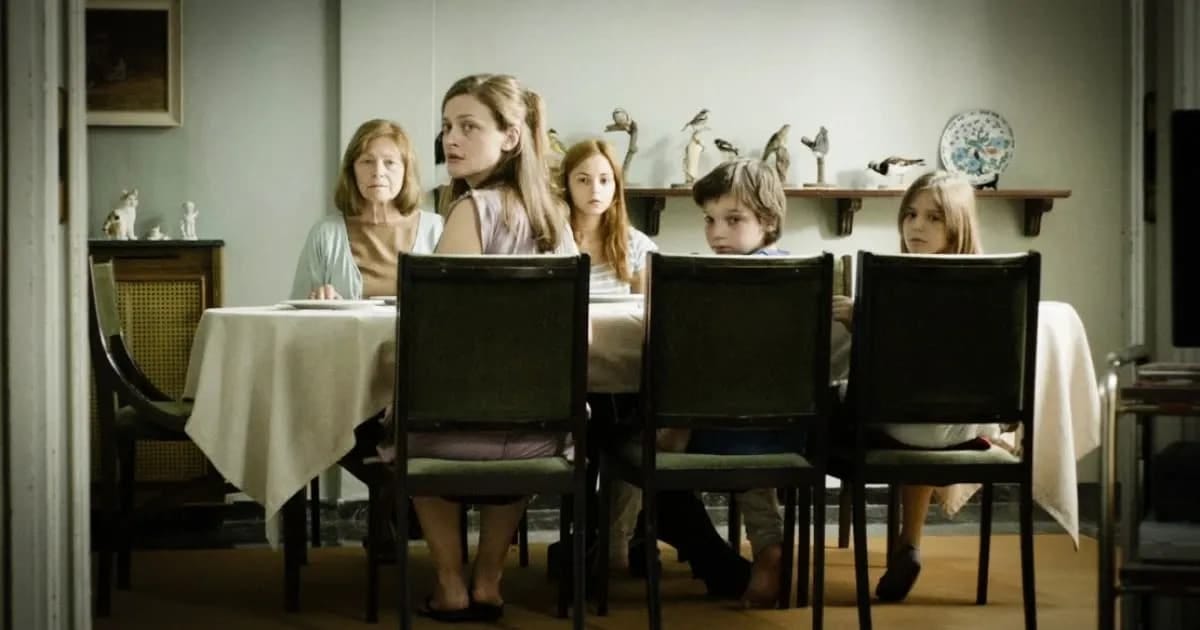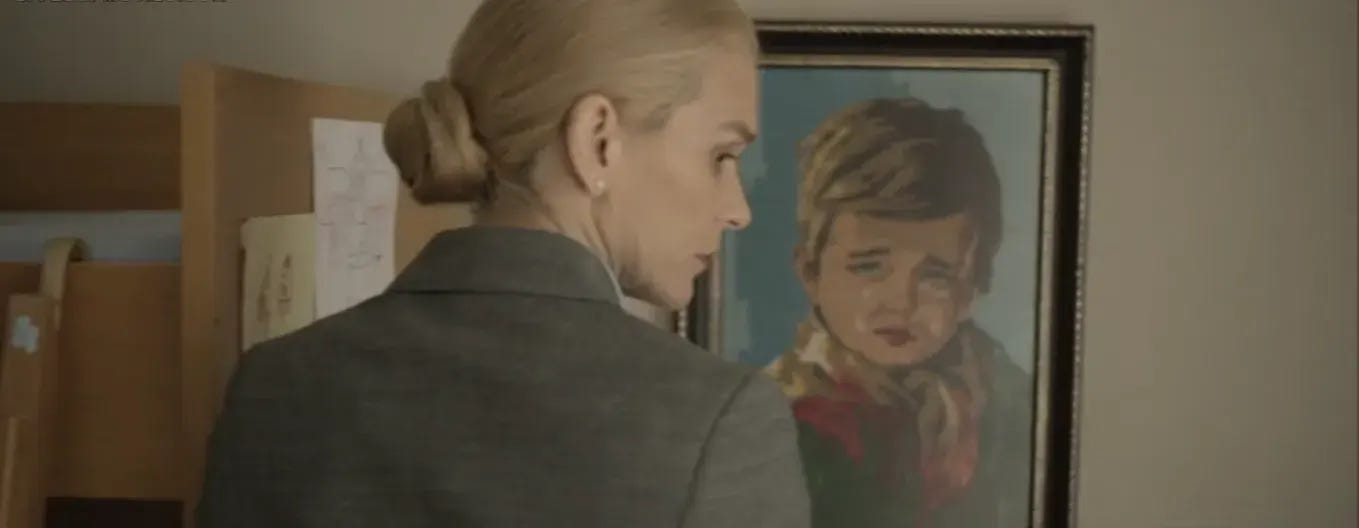Greek Weird Wave is one of the most bizarre film genres I’ve ever watched. To frame it in a historical context, it was heavily influenced by the Greek debt crisis in the late 2000s, which led to a blossoming of films that distilled the chaos and confusion of the turbulent period Greece was going through. One of its most notable characteristics is the characters portrayed, who are typically expressionless, detached from humanity, borderline depressive, and wicked.
Yorgos Lanthimos is considered to have pioneered the genre with his 2009 film Dogtooth. It’s clear that Avranas took inspiration from it for Miss Violence, though his effort doesn’t rely as heavily on the weirdness and dark comedy of Lanthimos’ work. Instead, he presents a more realistic and twisted story that blends explicit, abrupt shocks of visceral scenes with the subtlety of Michael Haneke. Quite a striking combination, huh?
The plot revolves around the unexpected suicide of Angeliki (Chloe Bolota) during her 11th birthday celebration with her family. Despite the seemingly joyful atmosphere, Angeliki’s blank expression and her horrific act hint that something is terribly wrong. Avranas masterfully paces the plot, revealing just the right amount of detail at just the right moments to keep viewers engaged and intrigued by the unfolding mystery, which, in order to explain in detail, I can’t help but start spoiling in the next paragraph. You can skip to the last one for my spoiler-free conclusion.
Everyone in the family seems to act as if nothing had happened after Angeliki’s death, except for a few sparse details here and there, such as Eleni’s (Eleni Roussinou) vague conversation with a neighbor about the incident, or the Father’s (Themis Panou) breakdown upon seeing the birthday cake in the fridge. Their conduct stems from the Father’s repression, which he imposes to stifle any emotional expression. This is best exemplified when he reprimands Eleni for mourning Angeliki’s death and when he humiliates Philippos (Constantinos Athanasiades) for being a tough guy at school. Although Angeliki’s motive remains unclear, we can certainly discern the source of the family’s strange behavior and the strong hierarchy led by the figure of the Father.
Obsessive control is one of the common denominators of psychopaths, as depicted in films like Funny Games (Michael Haneke, 1997), American Psycho (Mary Harron, 2000), or The Vanishing (George Sluizer, 1988) (you can read my review here). The Father fits this mold, as he controls everything and everyone in the family, from the submissive and complicit Mother (Reni Pittaki) to his daughter Eleni and his three grandchildren: Philippos, Myrto (Sissy Toumasi), and Alkmini (Kalliopi Zontanou). Details such as weighing the cereal when he comes home from work to ensure that no one has taken even a gram, forcing everyone but himself to leave the doors of their rooms open, and taking a regular job to justify the family’s income and divert the attention of the police investigating Angeliki’s suicide are well-thought-out details that Avranas included in his psychological profile to meticulously emphasize this trait. In addition, the Father is extremely polite and easily instills confidence and a good impression in people outside of his family, thus dispelling any possible suspicion about him, which is a reminiscent of the demeanor of the main characters of Funny Games.
Given the hermetic and strict behavior of the family, along with certain nuances, such as the unknown identity of the grandchildren’s father and the pills the Father forcibly gives Eleni, I theorized while watching the film that the term “grandchildren” was actually a euphemism for “children”, and that the Father had committed 1nC3s-T with Eleni. Although I wasn’t far off with the 1nC3s-T aspect, I admit that this lucubration is arguably more fucked up than the actual plot, but as an experienced viewer of nasty films, it’s something that wouldn’t have caught me off guard. Instead, Avranas opted to portray a father who sexually exploits his offspring for money, which is explicitly revealed in a scene where the Father takes Eleni to a client’s house. The grandchildren are actually Eleni’s children that she had with clients (or should I say the Father’s clients?). From that point on, I couldn’t help but think that the grandchildren would also be in the business and that everything would descend into degeneracy. Sadly, I wasn’t wrong.
I usually despise explicit sex in films because its main purpose is usually arousal and morbidity. However, its role in Miss Violence is similar to that in Irreversible (Gaspar Noé, 2002). It’s there to make you sick and to elicit empathy for the characters. At no point will you watch the scene with lasciviousness or sexual impulse (you don’t, do you?). It’s utterly disgusting, even more so when you consider that Myrto is supposed to be 14 years old in the context of the film, not to mention the 1nC3s-T scene.
In a spectacular first-person sequence shot from the Father’s perspective, which takes place when the police come home to investigate Angeliki’s suicide, Avranas includes a subtle but revealing detail about the plot that my friend Manolo pointed out while watching the film.
Note the painting in the background of the following screenshot:
It is an alternative version of The Crying Boy by Italian painter Giovanni Bragolini, which is associated with many urban legends that attribute a cursed status to it. Although most of these stories involve fire, which doesn’t appear in the film, it could symbolize the cursed fate of family’s children, condemned to prostitution (though it’s not clear what happens to Philippos), wretchedness, and misery.
We later learn that the reason for Angeliki’s suicide was that Myrto revealed to her what would happen after her 11th birthday — the age at which the Father begins to sexually exploit his grandchildren. However, she apparently didn’t tell Alkmini, as she is later shown to be the last victim of the Father’s depraved practices. When they return home, the Mother seems to know what the Father has done, as Alkmini seeks comfort from his mother, Eleni, over the traumatizing experience. The Mother’s deteriorating expression and subtle details, such as telling Eleni to go to sleep and cleaning knives, foreshadow the Father’s murder. It feels like a desperate act of rebellion against his hegemony, but the final scene spoils that euphoric moment. In the last line, the Mother says, “Eleni, lock the door”, with an imperative and authoritarian tone that makes me wonder if she is actually taking over the abusive regime established by the Father. Furthermore, I think the title gives us a clue, since the only female character who actually uses violence is the Mother. Perhaps the new reign involves more physical violence and is even worse than what is shown during the Father’s period…? I’d rather not know.
The portrayal of the family raises many questions for me. Is money the driving force behind these practices? While they appear financially comfortable, they aren’t ostentatious or materialistic. The grandchildren attend public schools and their clothes are quite ordinary. They have few toys and don’t seem to spend money, in part because the Father gives them hardly any. These details, combined with the Father’s ability to work a normal job, inevitably lead me to believe that the parents are driven by more than just money: they embody pure evil. It’s hard to tell whether Avranas developed this idea primarily because of Greece’s economic woes, or whether it was more of a side effect of showing how far sick minds can go. Either way, he accurately shows how a totalitarian system with strong discipline and a figure who helps from the shadows, like the Mother, can instill in people such submissive behavior and a constant sense of fear that prevents them from speaking out about their domestic situation.
I mentioned Hannah Arendt’s concept “the banality of evil” in my review of the The Zone of Interest, and I think it applies very well to Miss Violence too, especially to the characters of the Mother and the Father, who know exactly what they’re doing but act as if nothing ever happened, going about their everyday tasks intertwined with aberrant acts like domestic violence and pimping. Both are so dehumanized that they don’t even have names, unlike Eleni and the grandchildren, who have identities and their own accounts of the terrible situations they endured under their regime, but manage to compartmentalize their pain in order to carry on because they don’t know any other way.
Without the will to Google it, I’m afraid that people have done even worse things in real life. The human condition knows no bounds as long as sex, power and money are in the equation. I’m sure Avranas didn’t include the animal documentaries by accident, mainly because it’s hardly the only content the family watches on TV, except for the music show that makes Alkmini dance (the thought of the way the Father looked at her is repulsive). Even though our egocentric human perspective tricks us into believing that we have transcended our primitive animal instincts, we are still animals. We are still subjugated by basic things like sex and power, so on a foundational level we are not that far away from the monkeys shown in the documentaries.
While I can’t say that Miss Violence was an enjoyable watch due to how despicable the plot is, it is certainly a well-crafted film that succeeds in portraying the story that Avranas had in mind. The brilliant performances of the actors help to make the film all the more realistic, and the director’s attention to detail contributes to filling in any possible gaps that the plot or the psychological profile of the characters might have had. I highly recommend watching it if you are not easily disturbed (I really mean it), and if you want to see the cinematic representation of the word cynical and further develop your misanthropy. Keep in mind that it comes at the cost of seeing one of the worst atrocities a parental unit can commit, so it’s really up to you what weighs more in your balance. Oh, and don’t watch this with your date, with kids, or anyone you don’t really trust — unless you want to be seen as a weirdo.






